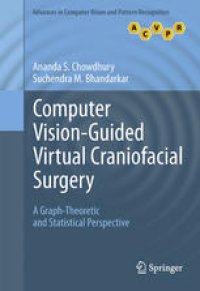
Ebook: Computer Vision-Guided Virtual Craniofacial Surgery: A Graph-Theoretic and Statistical Perspective
- Tags: Pattern Recognition, Imaging / Radiology
- Series: Advances in computer vision and pattern recognition
- Year: 2011
- Publisher: Springer-Verlag London
- City: London ; New York
- Edition: 1
- Language: English
- pdf
Recent advances in both scanning instruments and supporting software have transitioned their impact from merely outside the operating room to inside the surgical theater, making intra-operative 3D imaging a reality.
This unique text/reference examines the important application of computer vision and pattern recognition to medical science, with a specific focus on reconstructive craniofacial surgery. The book discusses in depth the two integral components of reconstructive surgery; fracture detection, and reconstruction from broken bone fragments. In addition to supporting its application-oriented viewpoint with detailed coverage of theoretical issues, the work incorporates useful algorithms and relevant concepts from both graph theory and statistics.
Topics and features:
- Presents practical solutions for virtual craniofacial reconstruction and computer-aided fracture detection, which can also be applied to related fields such as radiology, orthopedic surgery and histopathology
- Discusses issues of image registration, object reconstruction, combinatorial pattern matching, and detection of salient points and regions in an image
- Investigates the concepts of maximum-weight graph matching, maximum-cardinality minimum-weight matching for a bipartite graph, determination of minimum cut in a flow network, and construction of automorphs of a cycle graph
- Examines the techniques of Markov random fields, hierarchical Bayesian restoration, Gibbs sampling, and Bayesian inference
- Includes a Foreword by Dr. Jack C. Yu, Milford B. Hatcher Professor of Surgery at the Medical College of Georgia, Augusta, GA, USA
This practical text will be of great resource value to researchers and graduate students from a broad spectrum of disciplines including computer science, electrical engineering, biomedical engineering and statistics. Clinical practitioners such as plastic surgeons, orthopedic surgeons and radiologists will also find much of interest in the book.
Dr. Ananda S. Chowdhury is a reader in the Department of Electronics and Telecommunication Engineering at Jadavpur University, Kolkata, India. Dr. Suchendra M. Bhandarkar is a professor in the Department of Computer Science at the University of Georgia, Athens, GA, USA.
Graph-Theoretic Foundations -- A Statistical Primer -- Virtual Craniofacial Reconstruction -- Virtual Single-Fracture Mandibular Reconstruction -- Virtual Multiple-Fracture Mandibular Reconstruction -- Computer-aided Fracture Detection -- Fracture Detection Using Bayesian Inference -- Fracture Detection in an MRF-Based Hierarchical Bayesian Framework -- Fracture Detection Using Max-Flow Min-Cut